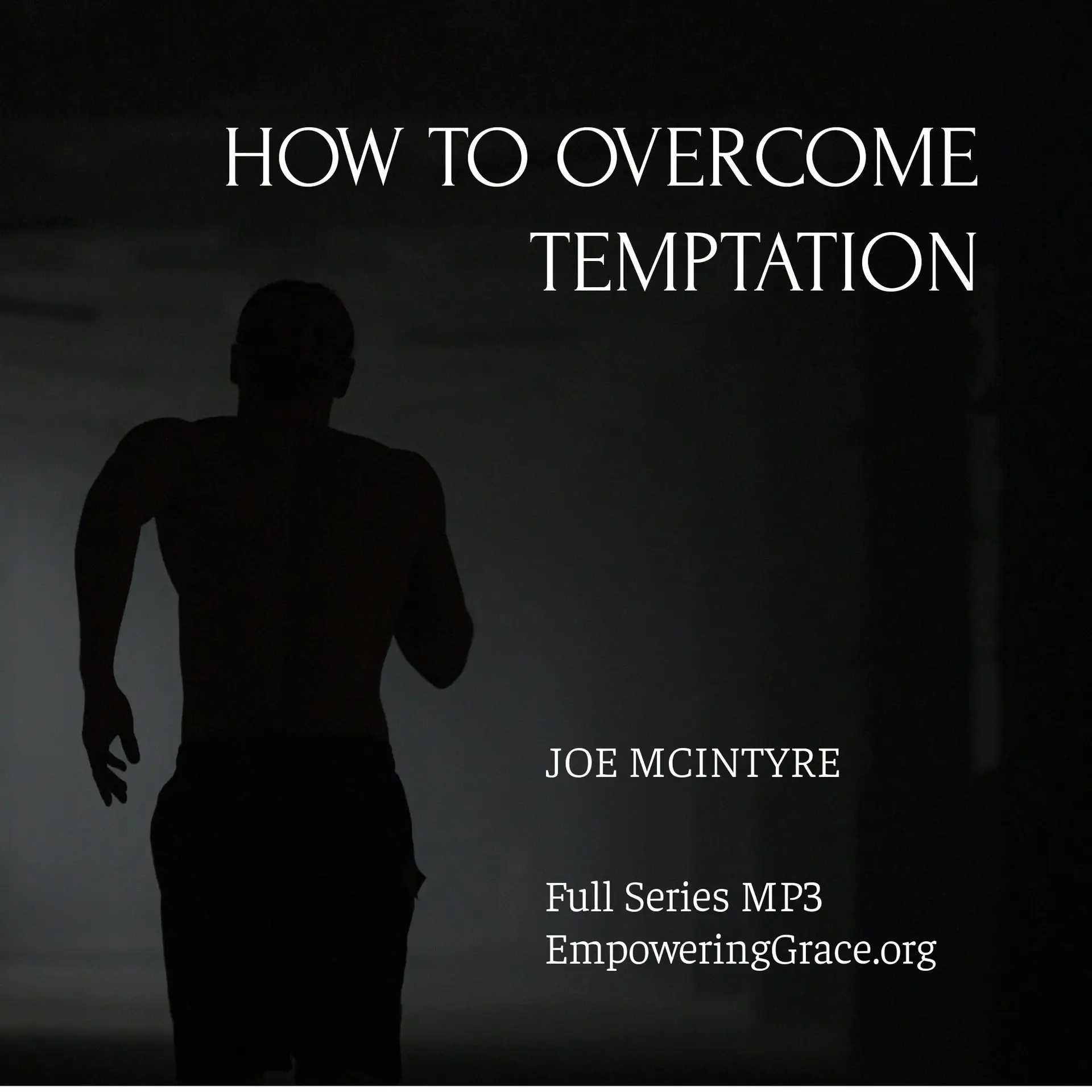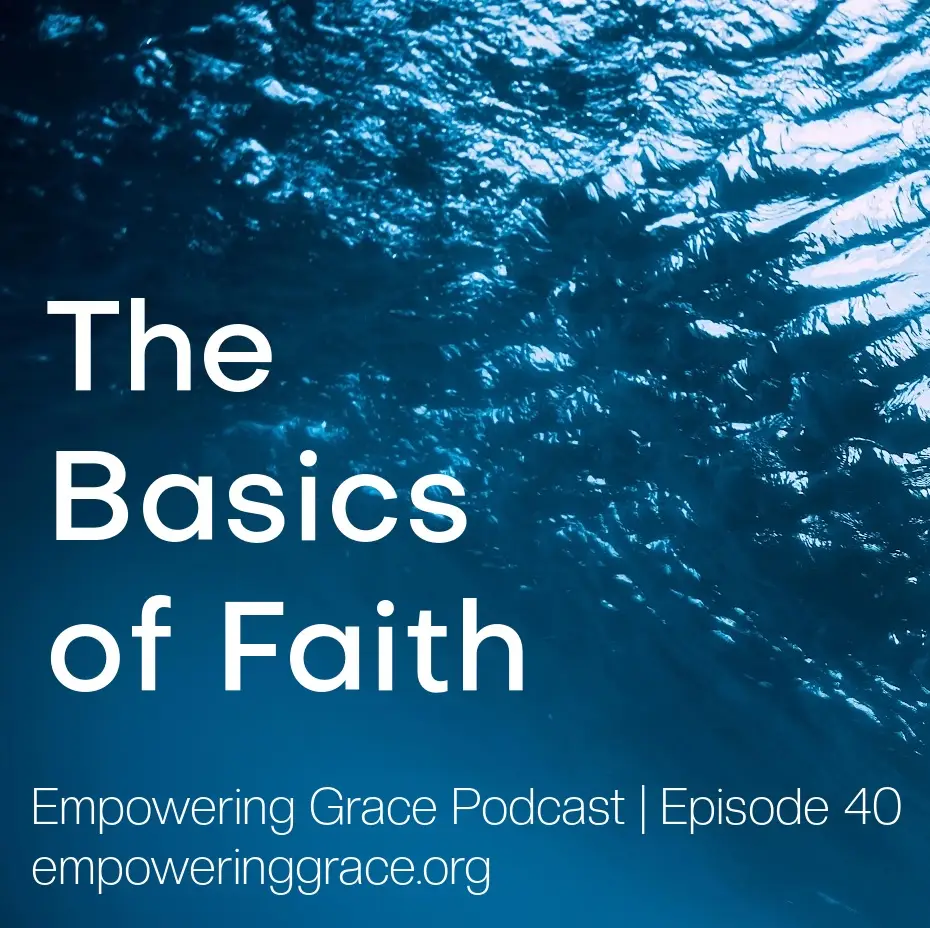We can’t all be Greek or Hebrew scholars but there are some simple techniques that can help us gain a richer picture of God’s word. In this introductory sermon to his 8-part study of the Book of Romans, Pastor Joe McIntyre shares:
- How you can read the Bible like a Hebrew
- The literal and contextual interpretations of key terms in the book of Romans: Righteousness, Life, and Faith (it’s not as simple as you might think!)
Don’t let weaknesses in our modern-day translations prevent you from laying hold of all God has for you in the book of Romans and beyond. This episode is pulled from a brand new online store offering, Romans Study – an 8-part MP3 series.
Additional Resources
Romans Study – an 8-part MP3 series
Full Transcript
All right, Father God, we ask You by Your Holy Spirit within us, to teach us tonight to illuminate us, Lord by the Holy Spirit. Father, you said, Pray that we would have a spirit of wisdom and revelation in the knowledge of you. We are praying to that end. And we ask You for it, in the name of Your Son, the Lord Jesus Christ. Amen. All right. Tonight, I wanted to cover the first 17 verses of Romans one, which is pretty much the first section. But in the first section, Paul is just introducing himself. But before we get to the verses, I have another handout there for you on key words or key concepts of Pauls. And I think it would be good to look at this, before we get into the actual book, because it’ll help you. Now we won’t go into it in great detail, but it’s a study from different commentaries that give you a little scholarly input on the key themes of the letter to the Romans, or at least the first eight chapters.
In a nutshell, there’s three key concepts, righteousness, life, and faith. And as we get to the 17th verse, we’ll find those three concepts summed up by Paul, in one quotation from the Old Testament. Something that you may not know is that in our English translations, there’s a Greek word family. That’s translated two different ways in our translations, for example, the same word is translated just is also translated righteous. The words justification, and just, righteousness, and righteous are all the same word family. So if you or I were actually reading this in Greek, we would immediately connect these concepts, but because of the weaknesses of our translations, when we see just we think of one thing, when we think of righteous we think of another. When we think of just we think of fair, giving what’s due. When we think of righteous we think as good maybe as kind or as benevolent, but they’re actually the same concept. And so when you read those in the Bible, as we’re going through this, I’ve given you McIntyre’s literal translation. And I’ve made these concepts, all righteous words, rather than just or justification words. Because if God declares something, he empowers his words to create something. In other words, we have sort of had the concept in the church, Well, God has declared me righteous, but he hasn’t made me righteous. Well, how can God declare a thing that isn’t real? You see, he declares the thing and when you receive his declaration, it becomes a reality. And that will be a major theme of the book of Romans.
Another word that we we come across in Romans is the word life and the word live or living. Now, there’s a number of Greek words in the New Testament having to do with life. But the word will, we will be calling your attention to in these studies is the Greek word Zoe and zao, the verb of it which means to live. Now, the reason that’s important is because in the Gospel of John, Jesus says, as my father has zoe in himself, so he has given to the Son to have zoe and himself. And then Jesus said, I have come that you might have zoe and have it abundantly. So Paul also uses this word family to describe the life that God gives. So it’s a very important theme in the book of Romans is that the life that God gives to us in the new birth is from himself. And our spiritual growth is learning to walk in that new kind of life, which we’ll see Paul develops in Romans.
The third key word in Romans is faith. And another unfortunate translation problem we have is that faith and believing are two different English words. But in the Greek, they’re just the noun and the verb from the same word, same word family. So to believe, is to exercise faith and to have faith is to believe. They’re the same concept. One is a noun, and one is the verb. But again, because of our English translations, they’re translated by different words. And I’ve actually heard Bible teachers talk about the difference between faith and belief. Well, biblically, there is no difference, they’re the same thing. And so these are themes that weave right through the book of Romans. And if you have a little preparedness to see them as Paul unfolds them it’s going to make a real difference in your understanding.
Now, some of you may know much about Romans, and others of you may know very little, the thing that I want you to do, as I said, is write down your questions so we can discuss them, and there’s no ignorant questions.
It’s possible to go 30 years in studying the Bible and not know certain things about it, because it’s an infinite book. What you may discover, as we go through the first eight chapters, is that I don’t necessarily agree with a lot of popular traditions. And so I may challenge some of the things you’ve heard before, and I’m totally open to discussing them, I’m not going to be dogmatic about them. But I will challenge you to think them through because sometimes our traditions rob us of the great truths that we need in our life. And so I will be challenging anything, I think, falls into that category. But as I say, I’m more than willing to discuss it. And you don’t have to agree with me to stay in the class. But if you disagree, you need to realize your reasons for disagreeing, because I have good reasons for what I’m saying. I have good research, but you have to realize that there are various opinions on everything in the Bible. But truth makes us free and tradition, Jesus said, makes the Word of God void.
So I’m against religious tradition that’s powerless. And I’m really for the Word of God that’s empowered. You can look those studies over. There’s a lot of valuable things in them that brings out more information on these three concepts. And I gave you that so that you can look it up. On the second page of the introduction, near the bottom of the page, there’s a section on Romans 1:17, from Vincent’s word studies in the New Testament. And he says here, it must be noted a peculiar usage of the dikaios righteous and dikaiosune righteousness in the Septuagint. The Old Testament scriptures were written in Hebrew. But some years before the time of Christ, they were translated into Greek. And I’m told by scholars that the most popular used translation in Jewish culture was the Septuagint, the Greek translation of the scriptures.
So one of the ways we know what a Greek word means to the Hebrew mind is how was it translated from the Hebrew into the Greek in the Septuagint. So that’s a clue. And that’s what he’s talking about here, how do they use these Greek words to translate Old Testament Hebrew? Because if you study this for a while, you come to the conclusion that the New Testament authors wrote in Greek but thought in Hebrew. I’ll give you an example. Take the word mercy. Well, we have an idea of what mercy means, kindness, benevolence, forgiveness. The Hebrew concept of mercy was faithfulness to the covenant manifesting in healing, health, deliverance or whatever you needed. It had a whole bunch of baggage to it. Well, the Greeks had a word for mercy that meant kindness. But you see, when a Jew read it, he read into it all the Hebrew background, because that was what was part of their culture.
We want to think like Hebrews. We want to think with the richness of all those Old Testament words, even though sometimes somebody says to you, “Well, the Greek word means this.” And when you know what it was used for, in the Septuagint, and you look at the Hebrew word, then you add to the meaning. That’s where when we talked about the Greek word zoe for life. Well, in the Septuagint, in the Garden of Eden, it was eating from the tree of zoe. So that word had some history for a Hebrew. He knew that that was the life that God gives. And that’s right there in all of Paul’s thinking is tree of Zoe. And then Jesus has come that we might have Zoe. And then Paul says, we’re saved in the zoe of Christ. So those words start to take on a fuller, richer, deeper, more powerful meaning, when you understand that.
Without spending a lot of time on it, that section down there has a number of the words for righteous and righteousness. And then he tells us how they were translated by different Greek words and different concepts. Like he mentions mercy, kindness, and all of these words, and you start to get a picture, that this word family is more than just being fair. It’s being benevolent. It’s being kind, it’s being faithful to your covenant promises, which I think is a great thing to to bring out. In fact, one modern scholar that’s very much a respected New Testament scholar, says that you should look at righteousness as the covenant faithfulness of God. God’s keeping covenant by fulfilling His promises. So you can look those over. And if you look at them during the week, and you have any questions, you want to discuss about them next week, we can. If it’s over your head with some of the Greek words, don’t worry about it, you can get the drift of it. And I just put them in there to try to bring some clarity. And so you’d know that I don’t make this stuff up.
All right, Romans one. I’ll read the first four verses. And then we can do a little commentary on it. I’ve got footnotes on all of these things, which I’ll discuss with you. If you get a good grasp of the first eight chapters of Romans, it’ll change how you read the rest of the Bible, because something you need to realize is Paul is a consistent Jew in the sense that all his expectations are based on the Old Testament. But he’s an inconsistent Jew in that he encountered the Messiah. And that changed the way he read the Old Testament Scriptures, and the expectation of Messiah, because the Jews were expecting a king like David, who would be a military conqueror, who would throw off the oppression of Rome and make Israel the head of the nations. But that wasn’t the Messiah that came and Paul was so outraged about that he was trying to put to death, those who were proclaiming that Jesus was the Messiah, until he encountered him. And then the veil came off the Old Testament, and he began to see Christ throughout the Old Testament, and became one of its greatest Proclaimers.
Verse one, Paul, a slave of Messiah, Jesus, called an apostle, separated to the good news of God. Many of our translations say bondservant, or bond slave, or servant of Jesus Christ. The Greek word is doulos. And there was a number of words for slave in the Old Testament. But if a slave served his master, and his master set him free, but he chose to stay with his master and serve him freely, then he became a doulos. They called it a bond slave. That’s how Paul describes himself, the willing bond slave of Jesus, called an apostle, separated to the good news of God. Most of our translations say gospel, good news. Sometimes we need to be reminded that this is good news. And so I put good news. I’m using Messiah instead of Christ. Because in our modern culture, Christ is almost Jesus’s last name. And actually, Messiah or Christ is a title. It was the anointed deliverer that the Jews were expecting. So, it actually means the anointed one.
When I discover a new way of looking at a familiar biblical term, in my own mind, when I read it, I translate it that way for a while to renew my thinking. For example, when I found out that salvation almost never just means the new birth, I started thinking deliverance. Whenever I would find saved or salvation I’d put in delivered or deliverance, because that’s the real concept. It wasn’t even a theological concept for the Jews. It just actually meant to be separate, to be delivered from either oppression or sickness or enemies or conflict. It was a practical, down to earth word for deliverance. Now, certainly the new birth for us is the most important aspect of our salvation. But I started sticking delivered or deliverance in there, so I wouldn’t limit myself to the new birth. And I would start to expand my thinking about salvation as being something that covers every area of my life, not just my eternal destiny.
Which he promised before through his prophets in the Holy Scriptures. Interesting thing about the revelation of Jesus that Paul got, it was a dramatic supernatural encounter with the resurrected Christ. Yet he went back and confirmed everything that he knew by revelation in the scriptures. That’s a good policy. In general charismatics want experiences. And I want to experiences like every charismatic. I want encounters with God. If God wanted to take me up to heaven, I’d be for that. But I want to judge every experience by the Scriptures. When something happens to me that’s supernatural, I’m going to ask God to confirm that for me in the word, because the word is our accurate tour guide of the spirit realm. I’ve never ever said that before, but that’s a good one. You see, you want to judge your spiritual experiences. Do they line up with the scriptures?
So he promised all of the things Paul preached in the old covenant scriptures, and concerning his son, Messiah, Jesus, who was born of the seed of David according to the flesh. Now, let’s just stop there for a second. The Jews were expecting the Messiah. They were thinking he would either be a warrior king, or he would be a holy priest. Zechariah promised that the king and the priest would sit together on the throne. And of course, he was talking about King priest, Messiah Jesus. So there were different ideas about the Messiah, but the two primary ones were that he would either be a king like David, or he would be a priest like Moses, or a prophet like Moses. And so he would kind of be the ultimate King, Priest, Prophet. And, of course he was, but they had ideas that were more cultural and carnal than was actually the truth about Jesus. But the scriptures were describing and revealing everything that was truly right about the Messiah. But as Paul said, in Second Corinthians, there was a veil over their hearts, and they couldn’t see the Messiah clearly. But when one turns to Christ, like we all have, Paul said the veil is lifted, so that we can read the Bible, and the Spirit of God can reveal Christ to us in the scriptures, both the old and the new. It’s interesting to note that Paul based everything he wrote for us on the Old Testament Scriptures.
And that Christ in the flesh was of the seed of David, he was a physical descendant of David, just like the scriptures had promised. And that’s the key in some of the later things that we would want to understand about Jesus. For example, in Isaiah six, it talks about that when the Messiah comes, he will sit on the throne of David, He will be David’s son and sit on the throne of David, and of the increase of His government and peace, there will be no end. Well, that’s the passage that we quote about, to us a child is given a son is born. That’s our Christmas verse. And it’s actually a prophecy of the reign of Jesus on the throne of David. So, that’s an important aspect of seeing the continuity of the Old Testament prophecies.




Leave A Comment
You must be logged in to post a comment.